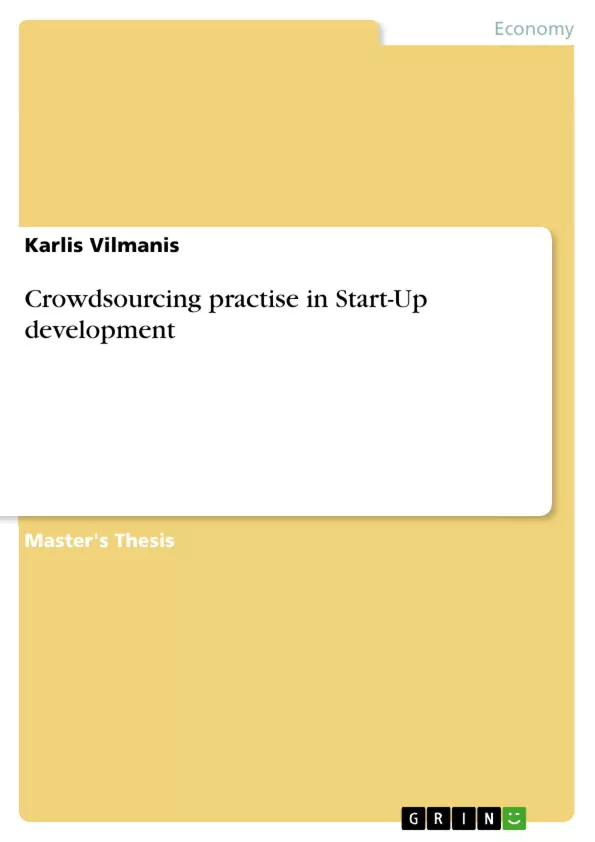This thesis has identified several influencing factors why start-up companies are not using crowdsourcing opportunities for their business development.
The author has reviewed different literature sources and theories, identified critical factors, developed a theoretical framework and set two research questions: To what extent are Start-ups aware of crowdsourcing opportunities as business development tools? How can Start-ups apply crowdsourcing principles for their business development?
The author analysed a survey, which consisted of 350 respondents, a case study was used to see how companies are using crowdsourcing for their business development and, using this data and framework, a conclusion and recommendation have been made. The data was evaluated using Cronbach alpha.
Inhaltsverzeichnis (Table of Contents)
- Introduction
- Literature review and Theoretical framework
- Crowdsourcing
- Crowdsourcing beneficeries
- Start-ups
- Forms of crowdsourcing
- Conceptual model of crowdsourcing
- The crowdsourcing process
- Open innovation
- Social network theory
- Sharing economy
- Crowdsourcing in Start-ups
- Research gap
- Theoretical framework
- Dependent and independent variables in research
- Development of research question
- Crowdsourcing
- Description of investigation, analysis and interpretation of results
- Description of investigation
- Findings from survey
- SPSS Software results
- Analysis of case study
- Crowdsourcing platforms
- Crowdsourcing Platforms and what is needed to join
- Observation of crowdsourcing platform
- Description of investigation
- Conclusion
- Recommendation
- Bibliography
- Guarantee
- Assessment
Zielsetzung und Themenschwerpunkte (Objectives and Key Themes)
This master's thesis explores the application of crowdsourcing in start-up development. The research aims to investigate the benefits of crowdsourcing for start-ups, analyze different forms of crowdsourcing and their impact on start-up growth, and examine the relationship between crowdsourcing, open innovation, and social network theory.
- Benefits of crowdsourcing for start-up development
- Different forms of crowdsourcing and their impact on start-up growth
- Relationship between crowdsourcing, open innovation, and social network theory
- The role of crowdsourcing platforms in facilitating start-up growth
- Application of crowdsourcing in the sharing economy
Zusammenfassung der Kapitel (Chapter Summaries)
The first chapter delves into the literature review and theoretical framework, examining the concepts of crowdsourcing, open innovation, social network theory, and the sharing economy. It analyzes the benefits of crowdsourcing for start-ups, outlining the different forms of crowdsourcing and their impact on start-up development. The chapter concludes by establishing the research gap and defining the theoretical framework, including the dependent and independent variables of the research.
The second chapter focuses on the description of the research investigation, analysis, and interpretation of results. It presents findings from a survey conducted among start-up founders, discusses the results obtained using SPSS software, and analyzes a case study of a specific start-up that utilizes crowdsourcing. The chapter further explores various crowdsourcing platforms, examining their features and requirements for participation, and concludes with observations of one specific platform.
Schlüsselwörter (Keywords)
The primary focus of this master's thesis is on crowdsourcing practices in start-up development, particularly its application in the sharing economy. Key concepts include open innovation, social network theory, different forms of crowdsourcing, and the impact of crowdsourcing platforms on start-up growth. The research utilizes survey data and case studies to examine the practical implications of crowdsourcing for start-up success.
Frequently Asked Questions
What are the benefits of crowdsourcing for start-ups?
Crowdsourcing allows start-ups to access external expertise, reduce costs, and accelerate business development by leveraging the "wisdom of the crowd."
How can crowdsourcing be applied in the sharing economy?
In the sharing economy, crowdsourcing principles are used to coordinate resources, facilitate peer-to-peer transactions, and build community-driven service platforms.
What is the relationship between crowdsourcing and open innovation?
Crowdsourcing is a key tool for open innovation, enabling companies to integrate external ideas and technologies into their internal development processes.
Why do some start-ups fail to use crowdsourcing opportunities?
Factors include a lack of awareness, difficulty in managing the crowdsourcing process, or concerns regarding intellectual property and social network dynamics.
What role do platforms play in the crowdsourcing process?
Crowdsourcing platforms act as intermediaries that connect start-ups with potential contributors, providing the necessary infrastructure for task management and collaboration.
- Citar trabajo
- Karlis Vilmanis (Autor), 2018, Crowdsourcing practise in Start-Up development, Múnich, GRIN Verlag, https://www.grin.com/document/430953



